Medgar Evers College Hosts Inaugural College Food Security Summit
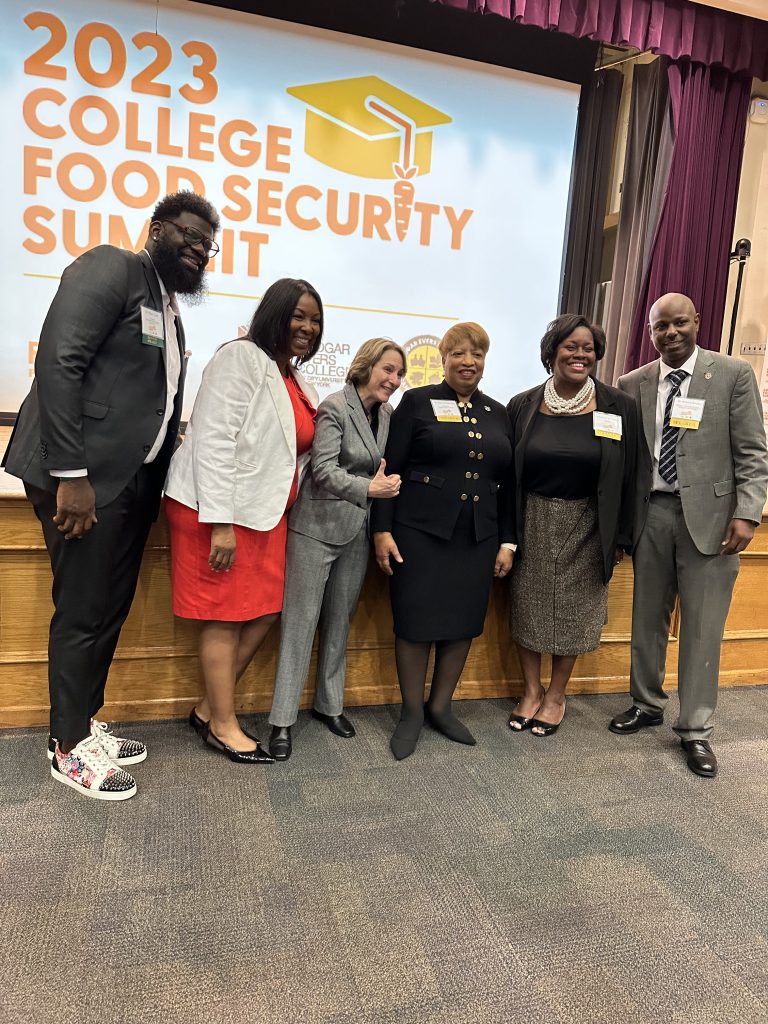
When Medgar Evers College Transition Academy partnered with the Food Bank for New York City (FBNYC) to host the inaugural College Food Security Summit at Medgar Evers College on October 18, 2023, it was a chance for members of academia, the government, and the community to empower college students across the city to achieve food security for good.
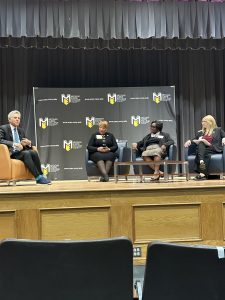
Opening remarks were provided by Dr. Camesha Grant (FBNYC VP of Community Impact and Investment), Dr. Jesse Kane (MEC SVP of Student Success and Enrollment Management), Dr. Patricia Ramsey (MEC President), Dr. Waleek Boone (MEC Transition Academy Director) and Leslie Gordon (FBNYC CEO). With upwards of 230 million meals and snacks being served daily by city agencies, public schools and senior citizens according to Gordon, it is an even more prevalent problem at the CUNY level as pointed out by Kate McKenzie, Executive Director of the Mayor’s Office of Food Policy. In explaining that cafeterias in K-12 public schools are a place that may be the sole source of nourishment for many students, the same can be said of their older CUNY peers.

“CUNY schools are a place where students can grab a meal in between classes, coming from a job or taking care of kids,” McKenzie said. “To know you have a readily available source of food is essential. And addressing food insecurity among CUNY students is essential to creating a supportive and equitable educational environment.”
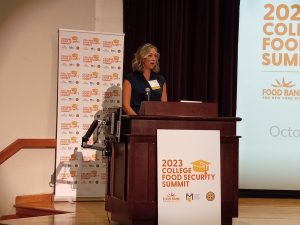
Pushing that point home further was Dr. Nicholas Freudenberg, a Distinguished Professor at the CUNY School of Health and the Faculty Director of Healthy CUNY. His work into food insecurity began back in 2010, when the then-chancellor asked Freudenberg and his colleagues to research why the numbers of CUNY students who were attending events that had free food were steadily increasing. Via a number of surveys, it was discovered that food insecurity was running rampant among students unbeknownst to school officials. Freudenberg most recently did a series of studies in 2018, 2020 and fall 2022, with the most recent results showing that 38 percent of all CUNY students suffer from food insecurity. One of his biggest takeaways was that the most meaningful solution to reduce food insecurity is to enroll people who are eligible into SNAP (Supplemental Nutrition Assistance Program) and using food pantries, off and on campus, to find out who is SNAP-eligible.
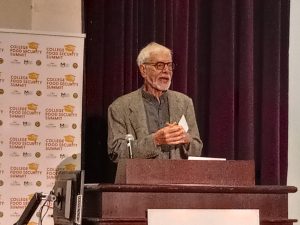
Freudenberg also highlighted the launching of CUNY CARES (Comprehensive Access to Resources for Essential Services), a three-year pilot program launched at Bronx Community College, Hostos Community College, and Lehman College, in partnership with the CUNY Chancellor’s Office of Transformation. The key to this new model is to help CUNY students find the campus and community-based essential services they need for health care, mental health, food and housing. The goal is to have the successful elements of this demonstration program to all 25 CUNY campuses.
A major highlight of the day was keynote speaker Akbar Cook, the principal of Newark’s West Side High School, who spent the past decade turning around this formerly low-performing school that was suffering from poverty and gang violence. Having gone to junior college in rural Kentucky, Cook shared that he was well familiar with food insecurity, which was rife in his school district when he arrived as a vice principal in 2014. His efforts to clean the situation up included opening his school up to nightly summertime sports nights, setting up a food pantry, and establishing an anti-bullying program that led to donations from the likes of Ellen DeGeneres and a number of corporations including Proctor & Gamble. His experiences led to his working as a consultant with 20 schools in New York City, two in Los Angeles and a pair in Las Vegas. And the one constant is making sure students don’t go hungry.
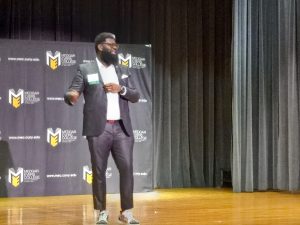
“I go around to mentor principals and tell them if we go back to Maslow’s Hierarchy of Needs, we have to make sure these babies are fed,” Cook said. “The first thing they have to do is put a food pantry in. You can’t say you care about kids if you don’t have a food pantry. And generally, that food pantry is also for the families and the staff.”
The main panel was made up of elected officials and CUNY presidents and was moderated by WABC-TV news anchor Bill Ritter. Dr. Ramsey shared the stage with Dr. Berenecea Johnson Eanes (York College, CUNY president) and New York State Assembly member Linda Rosenthal. When asked about how bad food insecurity is at MEC, Dr. Ramsey said it was a continual problem in our post-pandemic time.
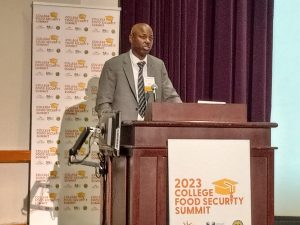
“In fiscal year 2023, 1,500 or our students were served by Transition Academy, where our pantry is,” she explained. “Now you have to consider 1,500 students and last year, the enrollment was only 3,416. You’re looking at almost 50 percent of the students being served. It is an ongoing issue we have not just as a college community, but as a nation.”
Dr. Ramsey wrapped the day up with a plea for empathy and action at the voting booth in order to effect the changes needed to battle poverty and food insecurity.
“We need to look at candidates who are trying to get into various offices locally, at the state level and the congressional level—and we support those [candidates] who are in it for the people and not themselves,” she said. “We have gotten into a society where it’s all about me. And we have to go back to community and love our neighbor as our self. Stand in the shoes of your neighbor and in the case of Medgar Evers College, the students. And think about yourself in their shoes and what you would want for someone to do for you and you do that for them.”